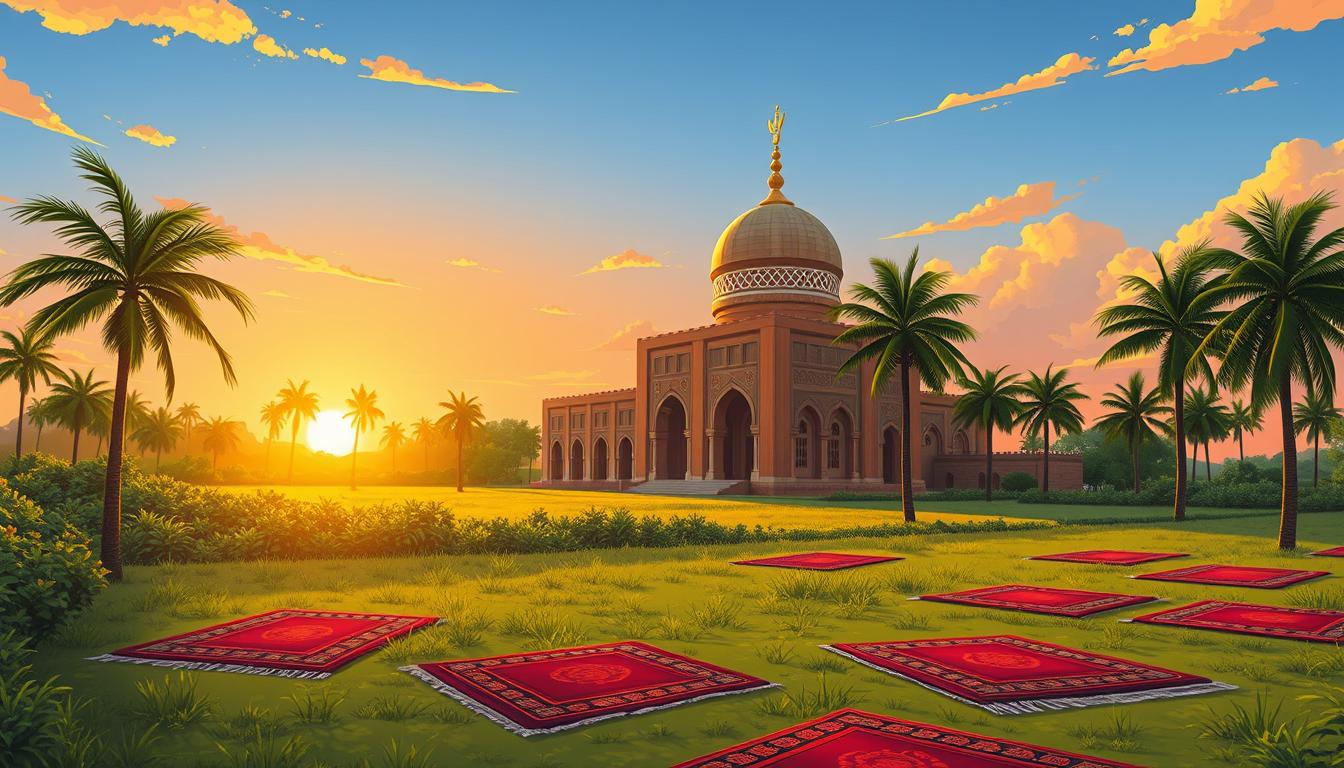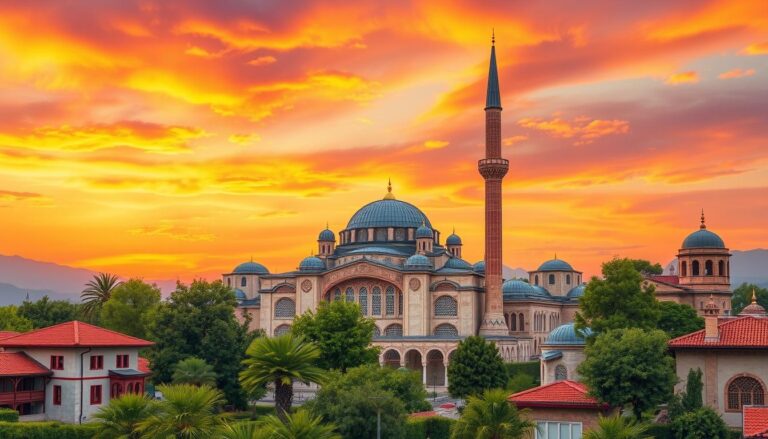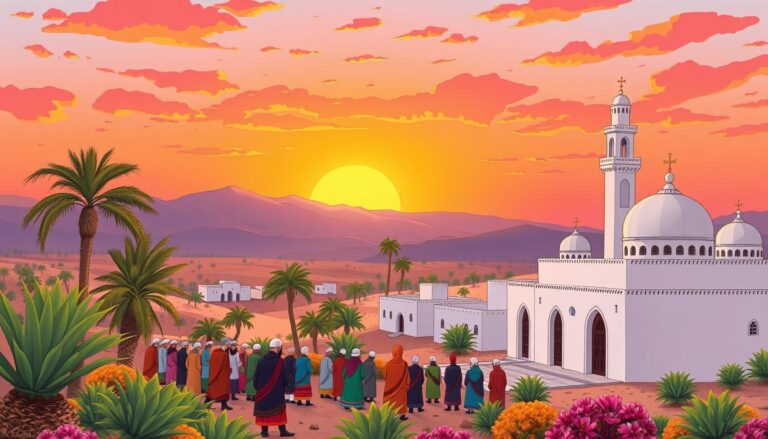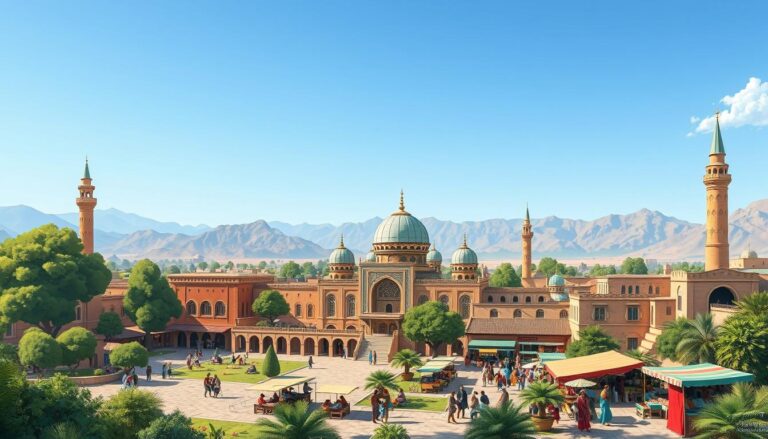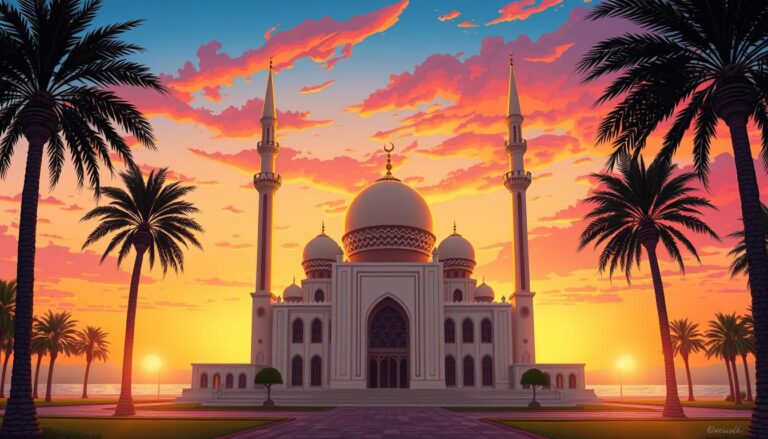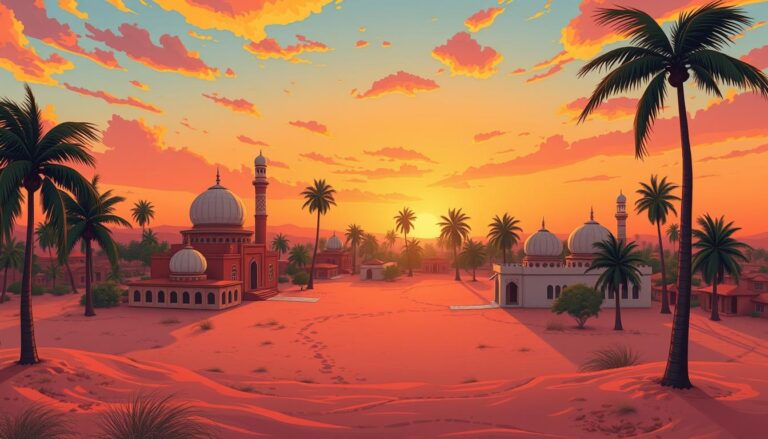Islam in Guinea
Guinea, a West African nation, is known for its rich Islamic tradition. About 85-90% of the people here are Muslim. This makes Islam a key part of their culture and religion.
The majority of Guinean Muslims are Sunnis. They follow the Maliki legal tradition and the Qadiri and Tijani Sufi orders.
Islam has been present in Guinea for centuries. It has greatly influenced the culture and society of the Guinean people. This has shaped their traditions, customs, and way of life.
Introduction to Islam in Guinea
Guinea, a West African nation, has a long history with Islam. This faith has shaped the country’s culture, society, and politics for centuries. The Mali Empire and the Imamate of Futa Jallon have left a lasting mark on Guinea’s heritage.
Islam as the Predominant Religion in Guinea
Today, Islam is the main religion in Guinea, with about 90% of people following it as of 2022. The Sunni tradition is followed, with a focus on the Maliki legal tradition and the Qadiri and Tijani Sufi orders.
Historical Influence of Islam in the Region
The spread of Islam in Guinea began centuries ago. By the 14th century, Islam was widespread in the region, thanks to the Malian Empire. The Fouta Djallon region became a key center of Islam in West Africa in the late 17th century, with the creation of the Imamate of Futa Jallon.
“The Fouta Djallon region in Guinea has been a stronghold of Islam since the late 17th century.”
Even under French colonial rule, Islam continued to grow in Guinea. By the 20th century, it became the dominant religion. This history has deeply influenced Guinea’s culture and society.
Spread of Islam in Guinea
The influence of Islam in Guinea started with the Mali Empire’s expansion in the 14th century. The Mali rulers converted to Islam, making it the state religion. This move helped Islam spread widely across the country.
Expansion of Islam through the Mali Empire
The Mali Empire was a key player in spreading Islam in Guinea. By the 14th century, its rulers had adopted Islam. They worked to spread the religion in their lands, leading to many local communities converting.
Establishment of the Imamate of Futa Jallon
Around 1725, the Imamate of Futa Jallon was founded in the Fouta Djallon region. This Muslim state became a center for Islamic learning and governance. It helped solidify Islam’s presence in Guinea.
“The spread of Islam in Guinea is a testament to the religion’s adaptability and its ability to integrate with local customs and traditions.”
The spread of Islam in Guinea took centuries, with the Mali Empire and the Imamate of Futa Jallon leading the way. This blending of Islamic practices with local cultures has created a rich Islamic heritage in Guinea.
Islamic Practices and Beliefs in Guinea
Guinea is a West African nation with a mostly Muslim population. Most Guinean Muslims follow Sunni Islam, specifically the Maliki school of jurisprudence. This school balances tradition and modernity, shaping the people’s religious practices and beliefs.
Sufism also has a big role in Guinea’s religious scene. Sufi orders like the Qadiri and Tijani are everywhere. They mix with local customs, creating a unique form of Islam.
The Muslim community in Guinea is diverse. While most follow Sunni Islam and Sufism, a small Ahmadiyya Muslim community is growing. They have their own way of understanding Islam.
“Islam in Guinea is a rich tapestry woven with the threads of Sunni traditions, Sufi mysticism, and a growing diversity of Islamic beliefs.”
Islamic practices are deeply rooted in Guinea’s history and culture. As the nation grows, Islamic practices and beliefs remain a big part of its social and cultural scene.
Islam in Guinea
Islam is a major force in Guinea, with 85-90% of people following it. This faith deeply influences the culture, social structures, and daily life of the country.
The Muslim population in Guinea mainly follows Sunni Islam, with the Maliki school of jurisprudence. Sufism, a mystical branch, also plays a big role, with several influential Sufi orders.
The history of Islam in Guinea began with the Mali Empire’s expansion. The Imamate of Futa Jallon later solidified Islam’s place in the country, leading to its widespread adoption.
Today, Islam touches every part of Guinean society, from schools to architecture. The Grand Mosque of Conakry is a stunning example of Islamic architecture, showing the faith’s strong influence.
Despite Islam’s dominance, Guinea has a peaceful mix of religions. The government supports religious freedom, allowing Muslims and Christians to practice openly.
As Guinea grows, Islam’s role in shaping its future is key. The faith’s strong presence and the devotion of its followers show Islam’s importance in Guinea’s identity and development.
Islamic Education and Institutions
In Guinea, Islamic education is key, especially in the Fouta Djallon region. The country’s schools don’t teach religion, but madrasas and other religious places are crucial. They shape the nation’s religious and cultural scene.
Madrasas and Islamic Schools
Guinea has many madrasas and Islamic schools for religious learning. They get money from places like Saudi Arabia and Kuwait. This helps them grow and stay open.
- Madrasas in Guinea teach the Quran and Islamic law.
- Islamic schools mix secular and religious studies. They prepare students for life and faith.
- These schools are vital for keeping Islamic knowledge alive in Guinea.
Government Support for Islamic Institutions
The Guinean government supports Islamic institutions a lot. In big cities, mosque leaders and staff get paid by the government. They get salaries and benefits.
“The government’s support for Islamic institutions shows the deep connection between the state and Muslims in Guinea.”
This support shows how important religion is in Guinea. It also shows the government’s effort to keep good relations with Muslims.
Islamic Architecture and Landmarks
Guinea boasts a rich Islamic heritage, with many architectural wonders. These marvels show Islam’s lasting impact in the area. The Grand Mosque of Conakry is a prime example of Islamic architecture. It symbolizes Guinea’s Islamic identity.
The Grand Mosque of Conakry
The Grand Mosque of Conakry was built in 1982, thanks to a donation from Saudi King Fahd. It’s the biggest mosque in West Africa, able to hold up to 12,500 people. The mosque has a large inner hall for 10,000 men and a balcony for 2,500 women.
Despite its size, the mosque has faced upkeep issues. In 2003, Saudi Arabia donated 20 billion GNF for maintenance. Yet, the mosque still lacks proper care. Still, it’s a key landmark in Guinea, showing the country’s Islamic roots and the faith’s lasting impact.
“The Grand Mosque of Conakry stands as a testament to the deep-rooted Islamic heritage of Guinea, showcasing the architectural prowess and religious devotion of the country’s Muslim community.”
The Grand Mosque of Conakry is among many Islamic landmarks in Guinea that highlight the country’s Islamic architecture. These structures remind us of Islam’s historical importance in the region. They continue to influence Guinea’s culture and religion.
Challenges and Opportunities for Muslims in Guinea
Guinea is known for its religious tolerance, but there are still tensions. In 2013, clashes in Nzerekore showed the need for more harmony. A 2021 case of an interfaith marriage also highlighted ongoing tolerance challenges.
The Guinean government is working to improve things. The Ministry of Islamic Affairs and the Inter-Religious Council are promoting dialogue. Their efforts aim to build mutual respect, but there’s still work to do.
Interfaith Harmony and Religious Tolerance
About 85 percent of Guinea’s people are Muslim. Christians make up 10 percent, and traditional beliefs 5 percent. The government supports many Christian denominations.
- The Ministry of the National Islamic League says 70 percent of Muslims practice regularly.
- Guinea has a small Baha’i community without official recognition.
- The U.S. Government talks about religious freedom with Guinea’s Government.
- The Inter-Religious Council in Guinea works with the Ministry of Islamic Affairs.
Economic and Social Development
The economic and social development of Muslims in Guinea is complex. Many Muslims work, but poverty, education, and healthcare are big issues.
The government supports Islamic schools and madrassas. But, these institutions need to align with national goals. They should prepare students for the country’s progress.
“Pope Francis emphasized the importance of collaboration between Muslims and Christians to foster a beautiful spirit of conviviality.”
Guinea’s religious tolerance is strong, but it must keep improving. The country needs to address Muslim challenges and create a fair society for all, regardless of faith.
Future of Islam in Guinea
Islam is a big part of Guinea’s life, and its future is key to watch. The government and Muslim leaders must face challenges, work together, and help the economy grow. This will shape Islam’s place in Guinea.
The number of Muslims worldwide is set to grow by 35% in 20 years. By 2030, there will be 2.2 billion Muslims. This means Islam’s role in Guinea will grow too.
But, there are big challenges ahead. Guinea is among the top countries facing religious persecution. To grow, Islam needs support from the government and Muslim leaders. They must promote peace, protect rights, and improve life for everyone.
“The ability of the Guinean government and Muslim community to navigate challenges, promote interfaith harmony, and foster economic and social development will likely shape the trajectory of Islam in the country going forward.”
The role of Islam in Guinea, its Islamic influence, and the future of Islam in Guinea will be watched closely. The growth of Muslims worldwide and Guinea’s unique challenges will deeply affect its culture and religion.
Conclusion
Islam has a strong presence in Guinea, with most people following this faith. Its history and influence are key to understanding Guinea. The Mali Empire helped spread Islam, and the Imamate of Futa Jallon established it firmly.
Today, Sunni Islam and the Maliki school are the main types. Sufism and Sufi orders also have a big impact. Islamic education and architecture show the faith’s importance in Guinea. The government supports different religious groups and activities.
The future of Islam in Guinea will bring both challenges and chances. Islam is a big part of Guinea’s identity and culture. As Guinea grows, Islam’s role in society, economy, and politics will be important to watch. Islam’s lasting presence in Guinea shows its strength and ability to adapt, shaping the country’s future.
Source Links
- Tolerance and Tension: Islam and Christianity in Sub-Saharan Africa
- Susu in Guinea
- Islam in Guinea
- The Spread of Islam in West Africa: Containment, Mixing, and Reform from
- History of Guinea — Consulate of the Republic of Guinea
- Spread of Islam
- Guinea – United States Department of State
- Religion in Guinea
- Religious Beliefs In Guinea (Conakry)
- Muslims of Equatorial Guinea – İnsamer – İnsamer
- Microsoft Word – IRPP_UPR_GIN_S08_2010_The Institute on Religion and Public Policy.doc
- Islamic Education in Africa
- Islamic Education in West and Central Africa
- Short Essay 17. Qur’anic School in Mamou, Guinea
- Grand Mosque of Conakry
- Muqarnas, an ornamental element of Islamic architecture
- Guinea
- Guinea: Pope invites Bishops to advance peace, dialogue and co-existence – Vatican News
- The Future of the Global Muslim Population
- Full Country Dossier Guinea 2024…
- Guinea – United States Department of State
- Guinea – United States Department of State
- BTI 2024 Guinea Country Report

